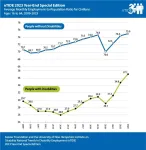(Press-News.org) Eating up to three daily servings of the Korean classic, kimchi, may lower men’s overall risk of obesity, while radish kimchi is linked to a lower prevalence of midriff bulge in both sexes, finds research published in the open access journal BMJ Open.
Kimchi is made by salting and fermenting vegetables with various flavourings and seasonings, such as onion, garlic, and fish sauce.
Cabbage and radish are usually the main vegetables used in kimchi, which contains few calories and is rich in dietary fibre, microbiome enhancing lactic acid bacteria, vitamins, and polyphenols.
Previously published experimental studies have shown that Lactobacillus brevis and L. plantarum isolated from kimchi had an anti-obesity effect. And the researchers wanted to know if regular consumption might be associated with a reduction in the risk of overall and/or abdominal obesity, which is considered to be particularly harmful to health.
They drew on data from 115,726 participants (36,756 men; 78,970 women; average age 51) taking part in the Health Examinees (HEXA) study.
HEXA is a large, community-based long term study of the larger Korean Genome and Epidemiology Study, designed to examine environmental and genetic risk factors for common long term conditions among Korean adults over the age of 40.
Dietary intake for the previous year was assessed using a validated 106-item food frequency questionnaire for which participants were asked to state how often they ate a serving of each foodstuff, from never or seldom, up to 3 times a day.
Total kimchi included baechu (cabbage kimchi); kkakdugi (radish kimchi); nabak and dongchimi (watery kimchi); and others, such as mustard greens kimchi. A portion of baechu or kkahdugi kimchi is 50 g, while a portion of nabak or dongchimi kimchi is 95 g.
Height and weight, for BMI, and waist circumference were measured for each participant. A BMI of 18.5 was defined as underweight; normal weight 18.5 to 25; and obesity as above 25.
Abdominal obesity was defined as a waist circumference of at least 90 cm for men and at least 85 cm for women. Some 36% of the men and 25% of the women were obese.
The results indicated a J-shaped curve, possibly because higher consumption is associated with higher intake of total energy, carbohydrates, protein, fat, sodium and cooked rice, say the researchers.
Compared with those who ate less than 1 daily serving of total kimchi, participants who ate 5 or more servings weighed more, had a larger waist size, and were more likely to be obese. They were also more likely to not be highly educated, have a low income, and to drink alcohol.
But after accounting for potentially influential factors, eating up to 3 daily servings of total kimchi was associated with an 11% lower prevalence of obesity compared with less than 1 daily serving.
In men, 3 or more daily servings of baechu kimchi were associated with a 10% lower prevalence of obesity and a 10% lower prevalence of abdominal obesity compared with less than 1 daily serving.
In women, 2-3 daily servings of this type of kimchi were associated with an 8% lower prevalence of obesity, while 1–2 servings/day were associated with a 6% lower prevalence of abdominal obesity.
And eating below average quantities of kkakdugi kimchi was associated with around a 9% lower prevalence of obesity in both sexes. And consumption of 25 g/day for men and 11 g/day for women was associated with an 8% (men) to 11% (women) lower risk of abdominal obesity compared with no consumption.
This is an observational study, and as such, can’t establish cause. And the researchers acknowledge that food frequency questionnaires can’t always accurately identify quantities, added to which the findings may not be generalisable to populations elsewhere in the world.
They also note concerns that kimchi contains salt, high quantities of which aren’t good for overall health, although the potassium found in the fermented vegetables may help to counteract this, they suggest.
They caution: “Since all results observed a ‘J-shaped’ association, excessive consumption suggests the potential for an increase in obesity prevalence. And as kimchi is one of the major sources of sodium intake, a moderate amount should be recommended for the health benefits of its other components.”
END
Up to three daily servings of kimchi may lower men’s obesity risk
And radish kimchi linked to lower prevalence of midriff bulge in both men and women
2024-01-31
ELSE PRESS RELEASES FROM THIS DATE:
Increase in annual cardiorespiratory fitness by 3%+ linked to 35% lower prostate cancer risk
2024-01-31
An increase in annual cardiorespiratory fitness by 3% or more is linked to a 35% lower risk of developing, although not dying from, prostate cancer, suggests research published online in the British Journal of Sports Medicine.
The findings prompt the researchers to conclude that men should be encouraged to improve their level of fitness to help lower their chances of getting the disease.
There are relatively few known risk factors for prostate cancer, note the researchers. And while there’s good evidence for the beneficial effects of physical activity on ...
High quality diet in early life may curb subsequent inflammatory bowel disease risk
2024-01-31
A high quality diet at the age of 1 may curb the subsequent risk of inflammatory bowel disease, suggests a large long term study, published online in the journal Gut.
Plenty of fish and vegetables and minimal consumption of sugar-sweetened drinks at this age may be key to protection, the findings indicate.
A linked editorial suggests that it may now be time for doctors to recommend a ‘preventive’ diet for infants, given the mounting evidence indicative of biological plausibility.
Cases of inflammatory bowel disease (IBD), which includes Crohn’s disease and ulcerative colitis, are increasing globally. Although there is no obvious ...
Next government should declare a national health and care emergency
2024-01-31
The government in post after the election should declare a national health and care emergency, calling on all parts of society to help improve health, care, and wellbeing, say experts in the first report of The BMJ Commission on the Future of the NHS.
The new government should, in effect, relaunch the NHS with a renewed long term vision and plan, they argue.
"The NHS has never seemed so embattled—and its core principle of ‘free to all at the point of use’ has never been so under threat,” said Kamran ...
Unprecedented success continues: 2023 employment gains for people with disabilities outshine those of counterparts without disabilities
2024-01-31
East Hanover, NJ – January 30, 2024 – Amidst the backdrop of a remarkable four-year streak of growth, the employment indicators for people with disabilities reached unprecedented milestones in 2023. This achievement stands in stark contrast to the experiences of people without disabilities who faced a more severe decline during the COVID-19 pandemic and a slower recovery, not surpassing their pre-pandemic employment levels until 2023. That’s according to the National Trends in Disability Employment (nTIDE) 2023 Year-End Special Edition, ...
Scientists pinpoint growth of brain’s cerebellum as key to evolution of bird flight
2024-01-31
**EMBARGOED UNTIL 7:01 P.M. ET TUESDAY, JAN 30**
Evolutionary biologists at Johns Hopkins Medicine report they have combined PET scans of modern pigeons along with studies of dinosaur fossils to help answer an enduring question in biology: How did the brains of birds evolve to enable them to fly?
The answer, they say, appears to be an adaptive increase in the size of the cerebellum in some fossil vertebrates. The cerebellum is a brain region responsible for movement and motor control.
The research findings are published in the Jan. 31 issue of the Proceedings of the Royal Society B.
Scientists have long thought that the cerebellum should be important ...
Machine learning informs a new tool to guide treatment for acute decompensated heart failure
2024-01-30
A recent study co-authored by Dr. Matthew Segar, a third-year cardiovascular disease fellow at The Texas Heart Institute and led by his research and residency mentor, University of Texas Southwestern Medical Center’s Dr. Ambarish Pandey, utilized a machine learning-based approach to identify, understand, and predict diuretic responsiveness in patients with acute decompensated heart failure (ADHF).
The study “A Phenomapping Tool and Clinical Score to Identify Low Diuretic Efficiency in Acute Decompensated ...
Clear legal rules about the use of sperm and eggs in fertility treatment must remain to protect the vulnerable, study says
2024-01-30
Clear legal rules outlining the use of the sperm and eggs of those who are incapacitated must remain in place to protect the vulnerable from being involved in fertility treatment without their consent, a new study says.
There are strict laws in England and Wales involving the use of reproductive materials, but the research outlines how recent court cases have weakened this existing rigorous consent regime.
It warns this could create a common law exception to informed consent, leaving the current law in a delicate position. The research says it is “not outside the realms of possibility” that some people may try to take ...
New interview with Eric Topol, MD, on the state of artificial intelligence in precision oncology
2024-01-30
An interview with Eric J. Topol, MD, a world-renowned cardiologist, best-selling author of several books on personalized medicine, and the founder and director of the Scripps Research Translational Institute in La Jolla, California, has been published. in the new peer-reviewed journal, AI in Precision Oncology. Dr. Topol is an advocate for using digital technologies and artificial intelligence in health care. click here to read the interview now.
Douglas Flora, MD, Editor-in-Chief of AI in Precision Oncology, interviewed Dr. ...
Rotman School Professor named to Thinkers50 Radar Class
2024-01-30
Rotman School Professor Named to Thinkers50 Radar Class
Toronto – Maja Djikic, an associate professor of organizational behaviour and human resource management at the University of Toronto’s Rotman School of Management, has been named to the Thinkers50 Radar class for 2024.
Announced every January, the Thinkers50 Radar identifies a cohort of 30 up-and-coming thinkers from around the world whose ideas have the potential to make an important impact on management thinking in the future.
A personality psychologist specializing in adult development, Prof. Djikic is executive director of the Self-Development Lab at the Rotman School, which provides ...
Researchers find early symptoms of psychosis spectrum disorder in youth higher than expected
2024-01-30
A new study co-led by Associate Professor Kristin Cleverley of the Lawrence Bloomberg Faculty of Nursing has found evidence that Psychosis Spectrum Symptoms (PSS) are often present in youth accessing mental health services.
From a profile of the initial 417 youth aged 11-24 participating in the study, 50 per cent were shown to meet the threshold for Psychosis Spectrum Symptoms, a number Cleverley says was higher than expected, meaning there is a large number of children with these symptoms accessing mental health services.
Cleverley, ...
LAST 30 PRESS RELEASES:
Hairdressers could be a secret weapon in tackling climate change, new research finds
Genetic risk for mental illness is far less disorder-specific than clinicians have assumed, massive Swedish study reveals
A therapeutic target that would curb the spread of coronaviruses has been identified
Modern twist on wildfire management methods found also to have a bonus feature that protects water supplies
AI enables defect-aware prediction of metal 3D-printed part quality
Miniscule fossil discovery reveals fresh clues into the evolution of the earliest-known relative of all primates
World Water Day 2026: Applied Microbiology International to hold Gender Equality and Water webinar
The unprecedented transformation in energy: The Third Energy Revolution toward carbon neutrality
Building on the far side: AI analysis suggests sturdier foundation for future lunar bases
Far-field superresolution imaging via k-space superoscillation
10 Years, 70% shift: Wastewater upgrades quietly transform river microbiomes
Why does chronic back pain make everyday sounds feel harsher? Brain imaging study points to a treatable cause
Video messaging effectiveness depends on quality of streaming experience, research shows
Introducing the “bloom” cycle, or why plants are not stupid
The Lancet Oncology: Breast cancer remains the most common cancer among women worldwide, with annual cases expected to reach over 3.5 million by 2050
Improve education and transitional support for autistic people to prevent death by suicide, say experts
GLP-1 drugs like Ozempic could cut risk of major heart complications after heart attack, study finds
Study finds Earth may have twice as many vertebrate species as previously thought
NYU Langone orthopedic surgeons present latest clinical findings and research at AAOS 2026
New journal highlights how artificial intelligence can help solve global environmental crises
Study identifies three diverging global AI pathways shaping the future of technology and governance
Machine learning advances non targeted detection of environmental pollutants
ACP advises all adults 75 or older get a protein subunit RSV vaccine
New study finds earliest evidence of big land predators hunting plant-eaters
Newer groundwater associated with higher risk of Parkinson’s disease
New study identifies growth hormone receptor as possible target to improve lung cancer treatment
Routine helps children adjust to school, but harsh parenting may undo benefits
IEEE honors Pitt’s Fang Peng with medal in power engineering
SwRI and the NPSS Consortium release new version of NPSS® software with improved functionality
Study identifies molecular cause of taste loss after COVID
[Press-News.org] Up to three daily servings of kimchi may lower men’s obesity riskAnd radish kimchi linked to lower prevalence of midriff bulge in both men and women





